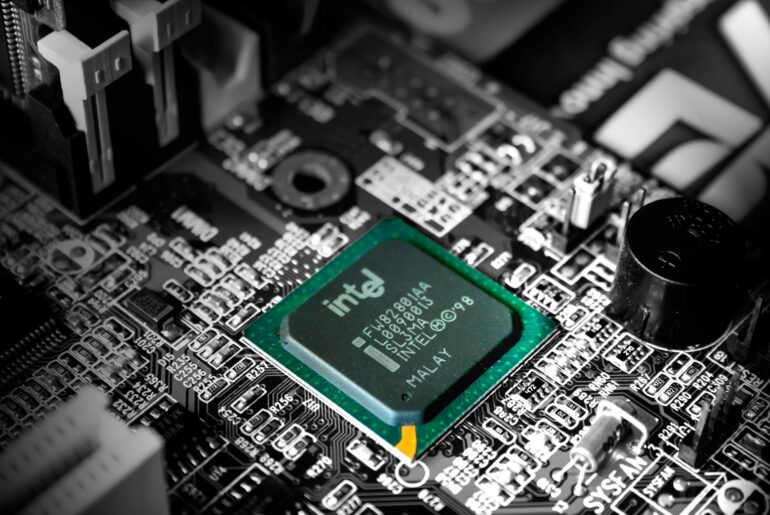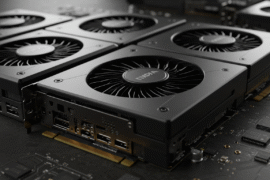This article may contain references to products or services from one or more of our advertisers or partners. We may receive compensation when you click on links to those products or services. Nonetheless, our opinions are our own.
The information presented in this article is accurate to the best of our knowledge at the time of publication. However, information is subject to change, and no guarantees are made about the continued accuracy or completeness of this content after its publication date.
- Intel Q4 Results Analysis 2025
- Assessing Intel’s Market Position After Q4 Results
- Key Factors Affecting Intel’s Performance
- Risks of Early Investment in Tech Stocks
- Evaluating Intel’s Strategy for Long-Term Growth
- Practical Steps for Investors While Waiting for Recovery
- Why Patience Matters in Tech Investments
-
Frequently Asked Questions
- What were the key takeaways from Intel’s Q4 report?
- Why is there skepticism about a turnaround by 2026?
- What is Intel’s strategy moving forward?
- How should investors approach Intel given current circumstances?
- What external factors could affect Intel’s performance?
- Is Intel a suitable investment for risk-averse investors?
- How does Intel compare to competitors in the AI chip market?
- Final Thoughts
- Recommended Reads
Intel Q4 Results Analysis 2025
Assessing Intel’s Market Position After Q4 Results
Intel’s latest results indicate a company navigating a challenging semiconductor landscape. The decline in year-over-year sales reflects softer demand in consumer and enterprise markets. Meanwhile, competitors continue to gain ground: AMD is increasing market share, and NVIDIA dominates the AI chip sector. Intel’s heightened research and development (R&D) spending may help, but tangible benefits may not materialize immediately.
Key points
- Revenue Decline: Intel reported a notable drop in sales across key segments.
- Competitive Pressure: AMD and NVIDIA continue to expand their presence in high-demand areas.
- R&D Investment: Increased funding for next-generation chips aims to restore competitiveness.
Comparison of Intel’s Q4 Performance Against Competitors
| Company | Q4 Revenue | Market Share |
|---|---|---|
| Intel | $14 billion | 20% |
| AMD | $6 billion | 25% |
| NVIDIA | $7 billion | 30% |
Key Factors Affecting Intel’s Performance
Intel’s current challenges are influenced by multiple external and internal factors:
- Market Competition: Rival innovations in AI and cloud computing pressure Intel to accelerate development.
- Supply Chain Issues: Geopolitical tensions and trade restrictions can disrupt production and increase costs.
- Corporate Restructuring: Operational streamlining may improve efficiency, though outcomes remain uncertain.
Impact of Key Factors on Intel’s Performance
| Factor | Impact on Performance |
|---|---|
| Market Competition | Increased pressure to innovate |
| Supply Chain Issues | Potential delays and higher costs |
| Corporate Restructuring | Possible efficiency gains |
Risks of Early Investment in Tech Stocks
Investing in Intel or similar tech stocks carries inherent risks due to market volatility and technological disruption.
- Market Sentiment: Investor perception can shift quickly, affecting stock price.
- Technological Disruption: Competitor advances may erode Intel’s relevance.
- Earnings Volatility: Quarterly reports can trigger sudden price swings.
- Long-Term Viability: Current strategies must align with industry trends for sustainable growth.
Intel’s Recent Performance Metrics
| Metric | Q4 Previous Year | Q4 Current Year |
|---|---|---|
| Revenue Growth | 22% | -10% |
| Gross Margin | 56% | 48% |
| R&D Spending | $15B | $18B |
Voted "Best Overall Budgeting App" by Forbes and WSJ
Monarch Money helps you budget, track spending, set goals, and plan your financial future—all in one app.
Get 50% OFF your first year with code MONARCHVIP
Evaluating Intel’s Strategy for Long-Term Growth
Intel’s strategy targets advanced manufacturing, strategic partnerships, and market diversification:
- Advanced Manufacturing: Expanding 7nm and 5nm production capabilities.
- Strategic Partnerships: Collaborating with tech firms and governments for funding and innovation.
- Market Diversification: Moving beyond PCs into AI and edge computing.
Key Indicators of Intel’s Future Growth
| Indicator | Current Status |
|---|---|
| Market Share in Semiconductors | Declining |
| Investment in R&D | Increasing |
| Product Launch Timeline | Delayed |
Practical Steps for Investors While Waiting for Recovery
Investors can mitigate risks while observing Intel’s trajectory:
- Diversify Portfolio: Spread investments across sectors to reduce risk.
- Stay Informed: Follow financial reports and industry trends.
- Evaluate Risk Tolerance: Adjust strategy to market volatility.
- Dollar-Cost Averaging: Invest consistent amounts over time to offset price fluctuations.
Financial Goals for Investors
| Goal | Action Step |
|---|---|
| Emergency Fund | Maintain 6-12 months of expenses in savings |
| Education | Enroll in courses on investing and finance |
| Long-Term Savings | Maximize retirement account contributions |
Why Patience Matters in Tech Investments
Investing in tech stocks like Intel requires a long-term perspective. Key questions to ask include:
- Are short-term trends buying opportunities or warning signs?
- Is Intel’s innovation pace sufficient to stay competitive?
- Can you maintain a long-term investment horizon despite volatility?
Intel’s Performance vs Industry Averages
| Metric | Intel | Industry Average |
|---|---|---|
| Q4 Revenue Growth | -15% | +3% |
| Market Share | 60% | 65% |
| Projected Growth 2026 | Positive | Steady |
Frequently Asked Questions
What were the key takeaways from Intel’s Q4 report?
Intel reported declining revenue, delayed next-generation chips, and increasing competition. These factors indicate ongoing challenges in maintaining market share.
Why is there skepticism about a turnaround by 2026?
Intel’s delays and competitor advances create uncertainty. While investments in R&D are rising, tangible recovery may take longer than projected.
What is Intel’s strategy moving forward?
The company focuses on advanced manufacturing technologies, strategic partnerships, and expanding into AI and edge computing to regain market competitiveness.
How should investors approach Intel given current circumstances?
Investors should diversify holdings, monitor quarterly results, and consider long-term strategies to reduce exposure to short-term volatility.
What external factors could affect Intel’s performance?
Supply chain disruptions, geopolitical tensions, and evolving market competition can impact production, costs, and revenue growth.
Is Intel a suitable investment for risk-averse investors?
Due to high volatility and competitive pressures, Intel may not suit conservative investors. Portfolio diversification can help manage exposure.
How does Intel compare to competitors in the AI chip market?
NVIDIA leads the AI sector, while Intel is investing in R&D to catch up. AMD is gaining PC and server market share, highlighting the need for strategic innovation.
Final Thoughts
Intel’s Q4 2025 performance reflects both challenges and potential for recovery. Investors should prioritize careful analysis, diversify their portfolio, and adopt a patient approach. By monitoring R&D progress, market trends, and quarterly results, investors can make informed decisions that balance risk and opportunity in the semiconductor sector.

Reviewed and edited by Albert Fang.
See a typo or want to suggest an edit/revision to the content? Use the contact us form to provide feedback.
At FangWallet, we value editorial integrity and open collaboration in curating quality content for readers to enjoy. Much appreciated for the assist.
Did you like our article and find it insightful? We encourage sharing the article link with family and friends to benefit as well - better yet, sharing on social media. Thank you for the support! 🍉
Article Title: Intel Q4 2024 Results: Revenue Drop and Market Share Shift
https://fangwallet.com/2025/08/20/intel-q4-2024-results-revenue-drop-and-market-share-shift/The FangWallet Promise
FangWallet is an editorially independent resource - founded on breaking down challenging financial concepts for anyone to understand since 2014. While we adhere to editorial integrity, note that this post may contain references to products from our partners.
The FangWallet promise is always to have your best interest in mind and be transparent and honest about the financial picture.
Become an Insider

Subscribe to get a free daily budget planner printable to help get your money on track!
Make passive money the right way. No spam.
Editorial Disclaimer: The editorial content on this page is not provided by any of the companies mentioned. The opinions expressed here are the author's alone.
The content of this website is for informational purposes only and does not represent investment advice, or an offer or solicitation to buy or sell any security, investment, or product. Investors are encouraged to do their own due diligence, and, if necessary, consult professional advising before making any investment decisions. Investing involves a high degree of risk, and financial losses may occur including the potential loss of principal.
Source Citation References:
+ Inspo
Intel Corporation. (2025, January 30). Intel reports fourth-U.S. Securities and Exchange Commission. (2025, January 26). NVIDIA Corporation 2025 Annual Report.
https://www.sec.gov/Archives/edgar/data/1045810/000104581025000098/finalforfiling-2025xannual.pdfquarter and full-year 2024 financial results. https://newsroom.intel.com/corporate/intel-reports-fourth-quarter-full-year-2024-financial-results











































